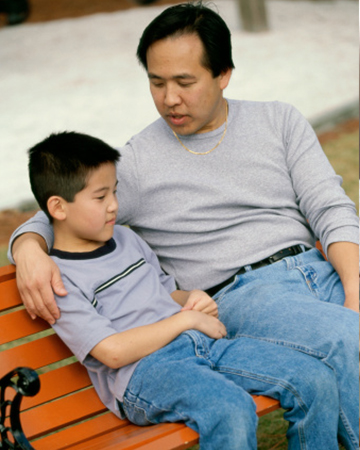
Helping your child grieve
Even if children sometimes seem like they're from another planet, they are fully human and experience all the same emotions as adults (sometimes with more honesty, too). Here is how you can speak age-appropriately with your kids when they hear the devastating news that a grandparent has passed away.
Nothing is quite as warm and nurturing as a healthy relationship between a child and grandparent. When a beloved grandparent passes away, many children are understandably devastated, but may not be able to express their anguish in ways that adults can understand. We spoke with developmental psychologist Dr. Nancy Buck to hear her take on childhood grief and bereavement and how parents can help kids cope with the painful loss of a grandparent.
The basics of childhood grief and loss
Sometimes, parents are surprised that even young children have a full range of emotions when dealing with loss, because they often process emotions differently than adults. "Understanding that children experience grief and loss is the first important step for parents," said Dr. Buck. Once you realize that your child is grieving — even if it manifests differently than adult grief — you'll be better prepared to appropriately manage your child's feelings and questions.
According to Dr. Buck, it's equally important for parents to realize that children process their emotions through play. "Children will spend a great deal of time playing and engaging in their usual activities following a loss," said Dr. Buck. "This doesn't mean that the child's feelings of loss are less. Children process these feelings differently, often incorporating facts and feelings into make-believe play." Play should never be discouraged during times of bereavement; instead, watch your children for any feelings that arise out of play so that you can provide appropriate comfort.
From infancy to adolescence
Of course, the loss of a grandparent is felt very differently between a toddler and a teenager. Here are a few things to keep in mind as you engage with your bereaved child:
- Toddlers: The grief experienced by a toddler is contingent on the type of relationship he or she had with the grandparent. "The younger the child, the more the mysterious disappearance of a loved one can cause confusion. If the child didn't spend a lot of time with the grandparent, he or she may feel very little grief or loss," said Dr. Buck. Very young children may only react to their own parents' feelings of loss or may feel stricken upon realizing that their parents will someday pass away, too.
- School-aged children: Many older children continue to process their feelings through play, but may also ask questions and talk about their feelings. It's helpful to answer questions factually with school-aged kids, while also sharing mutual memories.
- Teenagers: Adolescents also experience grief and loss, but they have the added stress of trying to figure out an appropriate social response to their feelings. "The struggle for a teen is understanding what is expected of her, how to act, how others are acting and whether it's disrespectful to feel 'normal' after a loss." It's important to both care for your teen's grief and to establish a role model for her behaviors and feelings, so she knows she is responding appropriately.
How to help your bereaved children
Dr. Buck was clear that there are several parenting techniques to keep in mind following the death of a grandparent, regardless of your child's age:
- Use books for help: If you're not sure what to say, find a children's book about the loss of a grandparent or loved one. Simply reading the book to your child will allow her to let her emotions out safely.
- Explain the cycle of life: Even before the death of a loved one, talk with your child about the cycle of life. You can use the seasons of the year as an illustration. If your child has an understanding of life and death before the loss of a grandparent, it will be easier for him to incorporate his feelings into what he already knows.
- Answer factually: Don't sugarcoat the facts with euphemisms like, "Grandmom went on vacation," or "Granddad had to go away for a little while, but he'll be back someday." This will only confuse your child.
- Don't avoid: If you avoid your child's emotions, you'll only make it harder for him to go through the stages of grief. Make sure your child understands that any emotions he experiences following a loss are OK.
More parenting advice
My sibling with disabilities embarrasses me
Has Facebook changed parenting?
When parents have different styles